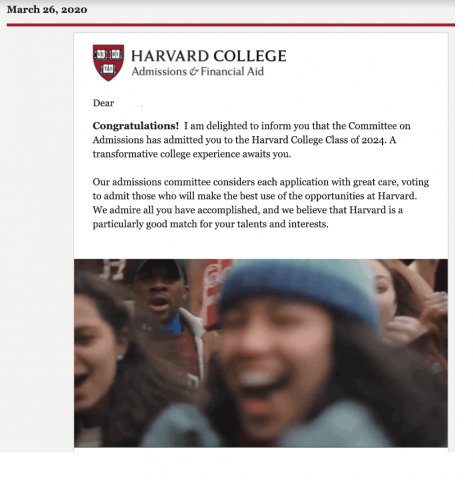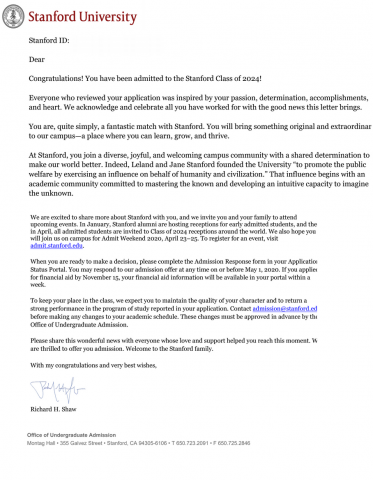Chris P., Frederic HS to Harvad & Stanford (Class of 2024)
Dr. Li’s Programs for Success on the SAT and Beyond
and
The Benefits Enjoyed by Early Birds
(See the admission letters appended)
As I prepared for high school, my father warned me of the rigorous curriculum high school courses cover. Assuredly, coming from middle school classes, which were each only 45 minutes and gave me minimal homework, I was fully expecting to feel a culture shock upon arriving as a Freshman. However, my Freshman year was a difficult transition. Sure -- my classes were hard, but they were relatively manageable. Ultimately, what challenged me was being able to balance my homework, studying for tests, extracurriculars, and my social life. Truth be told, my school didn’t even let me take an AP class freshman year. Thus, it was safe to say that I was a tad bit terrified entering into my sophomore year.
It was around the end of freshman year/beginning of sophomore year that I took Dr. Li’s SAT I and SAT II classes. Initially, I was pretty reluctant to even sign up for his programs. When going through high school, it can sometimes feel like standardized testing -- as well as the entire process of test prep -- is independent of academia and the extracurriculars you dabble in. Nonetheless, throughout both of Dr. Li’s classes, I learned some valuable lessons that stretched farther than scantrons: lessons that helped me build upon my passions and ultimately secure my dream.
Here are my testimonials for SATI and SAT2.
Without a doubt, Dr. Li’s classes taught me the importance of sharp focus. In fact, Dr. Li’s rapid-style lectures made it essential for you to focus on his class to keep up. The same can be said with Dr. Thomson, who often incorporated humorous anecdotes in addition to his lessons on grammar and rhetoric to help us students make more meaningful connections. Outside of class, there were a ton of practice problems to complete, often stretching into a myriad of topics with only one day to finish the entirety. Even when given a week, I’d often have to take 2-3 hours out of a weekday to finish a problem set in a simulated environment, skipping hanging out with my friends and other opportunities. In the end, however, I was still able to have a fun-filled and exciting summer while having my hard work pay off.
This idea of focus, time management, and sacrifice translated into my classes at Frederick High. I won’t claim that I was a perfect student in all of my AP classes, but by knowing when to lock in and when to take a mental break, I was able to balance the rigors of building apps, solving integrals, and learning about the French Revolution. When faced with 20 page long readings or 30 problem multiple-choice AP sets, I made sure to distribute the amount of work equally and set aside specific blocks of time where I could focus on getting my work done. Even as I ventured into new extracurriculars and made even more friends and memories, I found a way to prioritize work when necessary while still enjoying my time in high school. Sure -- I could’ve learned this skill through trial and error, but Dr. Li’s prep classes allowed me to see the importance of such discipline first hand and apply it while others struggled to balance.
Also, I was able to see the value of practice-based studying. I’ve never been someone who can focus when sitting in quiet and reading piles and piles of math handouts. However, Dr. Li showed me the power that attempting problems has. For one thing, you’re actively studying the subject material -- you’re not merely memorizing the algorithm, but applying it at the same time. Furthermore, I learned that I could build strong mathematical and problem-solving intuition by working at the content before it was taught. Given the curriculum Dr. Li put forward, as well as the fact that I took his boot camps as a freshman and sophomore, there were sure to be problems I couldn’t solve. Nonetheless, if I find the time, I would attempt to solve them before the start of each session; sometimes I was successful, and other times I was not. Regardless, when Dr. Li would end up teaching the concept during class, I was better enabled to solve the problem and knew what mistakes not to repeat and what good habits to keep pursuing. This process of using practice problems to build intuition is something I still apply to all the things I learn, whether it be for science or humanities AP courses.
With regards to the Reading and Writing sections, be prepared for Dr. Thomson to give you a lot of reading. It would be great if you were only reading about one subject from one period in history, but I can definitively say that I was better at trivia after going through Dr. Thomson’s practice problems and lectures. At first, I wasn’t too pleased -- I’m historically a STEM guy, so anything outside of indefinite integrals and torque was something I was not comfortable with. However, the SAT tests you on a plethora of styles of writing and pulls from different eras, so being able to experience such a variety of both content and difficulty made the readings both great for preparation and eventually interesting to read.
As I transitioned into higher-level AP classes, I was able to adapt to the different reading materials I had to learn from. Of course, not only did this mean reading American History, Physics, and even Economics textbooks, but I also employed annotation strategies, ways of thinking and rereading a text, and problem-solving strategies in terms of understanding the core ethos of a piece of literature, or even just understanding one singular word. Overall, I was able to succeed in all of my classes, all while having long-lasting comprehension of the subject matter and igniting curiosity in those topics as well.
Overall, Dr. Li’s boot camps were experiences I would never take back. The focused and rigorous curriculum, amusing anecdotes, and life-long study skills I gained through the programs are just a few of the benefits reaped, and I’m sure that this experience will stick and have influence no matter where academia and life take me.


